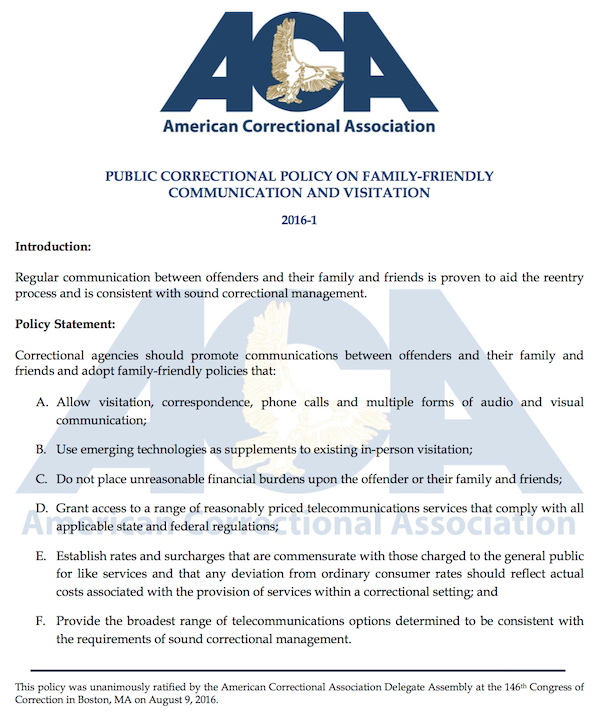American Correctional Association says that video visitation should not replace in-person visits
We are thrilled to see the ACA support the common sense idea that emerging technologies should supplement, not replace, in person visits.
by Lucius Couloute, April 24, 2017
 As we mentioned in our January 2015 report, in four conferences going back to 2001, our nation’s leading professional organization for correctional officials, the American Correctional Association, has consistently declared that “visitation is important” and “reaffirmed its promotion of family-friendly communication policies between offenders and their families.”
As we mentioned in our January 2015 report, in four conferences going back to 2001, our nation’s leading professional organization for correctional officials, the American Correctional Association, has consistently declared that “visitation is important” and “reaffirmed its promotion of family-friendly communication policies between offenders and their families.”
Last August, the American Correctional Association went further by explicitly declaring that emerging technologies (like video visitation) should only be used to supplement existing in-person visitation.
The ACA isn’t the only national association to take a stand; the American Bar Association’s standards state that video visitation should not replace in-person visitation.
These resolutions are important because they tell the hundreds of jails that have replaced in-person visits with video visitation that these jails are violating correctional best practices.
Since jails incarcerate people who tend to be extremely poor, video visitation can come at a great cost to their families. At up to $1.50 per minute, a single 15-minute video visit can be the difference between buying a day’s worth of food, or forgoing groceries to speak with a loved one. The American Correctional Association understands this economic reality, urging correctional facilities to “not place unreasonable financial burdens upon the offender or their family and friends.”
As a supplement to in-person visits, video visitation can help connect families who are far apart. We are thrilled to see the ACA include in their Public Correctional Policies the common sense idea that emerging technologies should supplement – not replace – in person visits.
For more information on this issue and to see country wide press coverage, see our report and organizing on the for-profit video visitation industry in prisons and jails.



